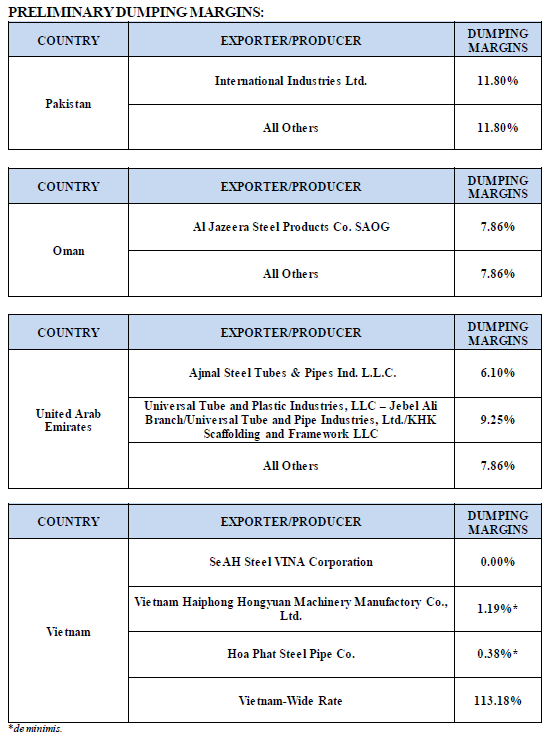Government/Policy

June 1, 2016
Commerce Finds Dumping of Circular Welded Carbon-Quality Steel Pipe
Written by Sandy Williams
On June 1, 2016, the Department of Commerce announced its affirmative preliminary determinations in the antidumping (AD) investigations of imports of circular welded carbon-quality steel pipe from Pakistan, Oman, United Arab Emirates, and Vietnam.
The investigations cover welded carbon-quality steel pipe and tube, of circular cross-section, with an outside diameter not more than 16 inches, regardless of wall thickness, surface finish, end finish, or industry specification. The products are generally known as standard pipe, fence pipe and tube, sprinkler pipe, and structural pipe and are intended for the low-pressure conveyance of water, steam, natural gas, air and other liquids and gases in plumbing and heating systems, air conditioning units, and automatic sprinkler systems. The products may also be used for light load-bearing and mechanical applications, such as for fence tubing.
Commerce preliminarily determined that imports of circular welded carbon-quality steel pipe from Pakistan, Oman, United Arab Emirates, and Vietnam have been sold in the United States at dumping margins of 11.80 percent, 7.86 percent, 6.10 percent to 9.25 percent, and 0.00 percent to 113.18 percent, respectively.
In 2014, imports of circular welded carbon-quality steel pipe from Pakistan, Oman, United Arab Emirates and Vietnam were valued at an estimated $17 million, $33.1 million, $59.4 million, and $60.6 million, respectively.
The petitioners in this investigation are Bull Moose Tube Company (MO), EXLTUBE (MO), Wheatland Tube (IL), and Western Tube & Conduit (CA).
Next Steps
Commerce is scheduled to announce its final determinations on or about October 16, 2016; unless the statutory deadline is extended.
If Commerce makes affirmative final determinations, and the U.S. International Trade Commission (ITC) makes affirmative final determinations that imports of circular welded carbon-quality steel pipe from Pakistan, Oman, United Arab Emirates and/or Vietnam materially injure, or threaten material injury to, the domestic industry, Commerce will issue AD orders. If either Commerce’s or the ITC’s final determinations are negative, no AD orders will be issued.
The ITC is scheduled to make its final injury determinations in November 2016.








